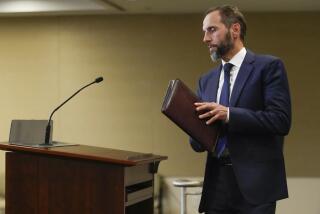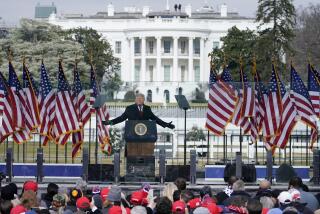There will be no secret trials
I have read with great disappointment the Op-Ed article by Morris D. Davis, former chief prosecutor for the Office of Military Commissions, particularly his comments with regard to Susan Crawford, the military commissions convening authority.
Since October, Davis has repeatedly complained about the very military commissions he oversaw for two years. He has criticized the commission process for moving too slowly, resulting in only one case being tried, by a guilty plea. After that plea was negotiated, with Davis’ written concurrence, he claimed publicly that he was not properly consulted.
Davis has recently protested that politics has been inserted into the process, which he in many ways controlled, alleging improper pressure from me, from the department’s general counsel, Jim Haynes, and now from Crawford. Specifically, Davis insinuates that she is politically motivated and that she lacks impartiality. He claims though that he never breathed a word of this to me that the pressure to move cases more rapidly was politically motivated.
But one should be careful when one challenges the reputation of others. Crawford has not directed or influenced the way any military commission case will be tried. Davis knows that I, without any political interference, directed him to evaluate more carefully the evidence, the cases, the charging process, the materiality of the cases, the speed of charging, the training program and the overall case preparation in the prosecution office. Interestingly, when I testified before Sen. Jeff Sessions (R-Ala.) that some cases are moved more quickly than others because they have the most material evidence, he commented: “Well, I think it’s almost prosecutorial incompetence not to think in those terms. It’s important that you do so.”
Davis further contends that he resigned within hours of learning that I would report to General Counsel Haynes, and as my subordinate, Davis would be under Haynes in the chain of authority. This was also just hours after he learned the results of an independent military panel appointed by Haynes after consultation with the service Judge Advocates General that concluded I had not improperly asserted my authority. That report was immediately made available to the public. It is worthy of note that Haynes had, months before, signed a performance evaluation on Davis, suggesting that Davis was already in the chain of command. Davis did not object then.
Davis also charges that the commissions are no longer “full, fair, and open trials.” This is particularly biting as he knows that the process offers unprecedented rights to alleged war criminals. Indeed, he wrote and spoke of that often. He also knows how much effort the prosecution and defense teams have dedicated to the fairness of the process a process played out in United States vs. Hamdan.
Regarding his new allegations that the trials are not open, Davis knows that national security demands that certain evidence remain classified. He had an especially high security clearance for that very reason. But there will be no “secret” trials. Though we must safeguard classified information in order to protect ongoing operations and our soldiers, sailors, airmen and marines, not one piece of evidence will go to a commission jury without review and the opportunity to object by the accused and his counsel.
Military commissions are now moving forward fairly and transparently. As they continue, critics will see uniformed service members, including judges, prosecutors and defense counsel, conduct trials with the dignity, fairness, and respect for law that defines American military justice a justice system that remains the envy of the world.
Air Force Brig. Gen. Thomas W. Hartmann is a legal advisor to the Department of Defense Office of Military Commissions.
More to Read
A cure for the common opinion
Get thought-provoking perspectives with our weekly newsletter.
You may occasionally receive promotional content from the Los Angeles Times.






